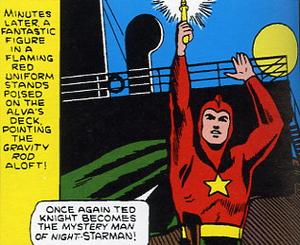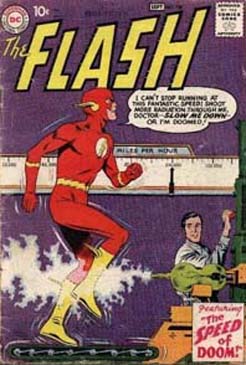I think part of the reason for that may be a simple tactical error in storytelling.
If you read Golden Age stories, you'll notice that they are, for the most part, told from an outside third-person perspective. Oh, sure, you get to peek in on some heroic thought-balloons, but more often the character would say what they were thinking aloud, sometimes to nobody in particular. As odd as that may seem, it seemed less odd to Golden Age writers than giving us readers the ability to continually read characters' minds. So mostly the viewpoint in Golden Age stories was that of the omnipresent narrator, a feeling reinforced by the frequent use of narration boxes.
 Uh, Ted? Who exactly are you talking to? Are you violating the fourth wall? Why are you talking about yourself in the third person?
Uh, Ted? Who exactly are you talking to? Are you violating the fourth wall? Why are you talking about yourself in the third person?Are you talking out loud to ... yourself? And why were people suprised when you wound up in a sanitarium?
Then in the Silver and Bronze Ages, as our heroes became more individuated and personalized, the story began to be told more and more from their perspective. This had advantages, of course, allowing stories that depended more on character and not entirely on plot. Yet, like all things, its pros came with cons.
One downside was the apparent erosion of writers' ability, willingness, or (at the very least) need to tell a story and reveal character through word and action (which is how we perceive the real world), which is lot harder than resorting to emotive thought balloons.
Many have praised the storytelling in the animated series universe (both on TV and in comics) for its fresh takes on old characters and situations. But often they fail to notice that the "freshness" in the animated stories comes also in part from its focus on telling the story from 'the outside', without (many) thought balloons or their voiceover equivalents. The revelation of character comes almost entirely from word and action, with plots chosen to complement those revelations. In that way, the animated series storytelling is more like a Golden Age story than a modern one.

That's all very interesting, but what's it got to do with the Flash? Simple: once you start telling Flash stories from Flash's perspective
everything
slows
down.
From our outside perspective, the Flash speeds up. But from his perspective, everything else slows down. When actively Flashifying, the Flash operates in a world that moves achingly slowly. That's the environment his stories happen in. They are ... the Slowest Stories Alive. If there is any character whose stories should offer only brief glimpses of the hero's perspective, it's the Flash.
Imagine, if Flash stories actually raced along at the breakneck pre-decompression speed of a Golden Age tale. Isn't that the kind of high-speed excitement that speedsters fans are really looking for when they read about the Fastest Man Alive?
But apparently "slow" is not enough; the Flash must be tedious as well.
Now Bart Allen, former symbol of youthful comic book fun, has been sucked in to the role of slow-moving, self-doubting, thought-balloon-burdened angstmonger. Oh, look, it's cheery Dick Grayson turning into morose Nightwing all over again! Who thought that was a good idea?
The Flash used to be good SilverAge pseudoscientific fun (which, as Gail Simone is showing with the Atom, can still be done right now). But then Barry eventually got sucked into personal troubles and Iris dying and Fiona and the trial and ... hey, they cancelled Flash.
Then Wally's title began, and he was adventurous and a bit devil-may-care, and then after a while he got sucked into personal troubles and Linda and the speed force and villains with coke addictions and ... hey, they cancelled Flash.
Now Bart's title begins with him losing any of the fun he had being Impulse or even Kid Flash, and starts off with personal troubles and a half-baked love interest and the speed force and...
Hey, at least I'm enjoying Green Lantern, Atom, and Wonder Woman.

I think the concept is the least of the current Flash comic's problems.
ReplyDeleteThe writing and art are just plain bad.
For the all the criticism that the "de-funning" of Bart deserves, I can't imagine the book even appealing to people who want a comic about a reluctant superhero with personal troubles.
I'm with you, I'd love to see Flash as a fast-moving science title.
ReplyDelete"
ReplyDeleteThen in the Silver and Bronze Ages, as our heroes became more individuated and personalized, the story began to be told more and more from their perspective. This had advantages, of course, allowing stories that depended more on character and not entirely on plot. Yet, like all things, its pros came with cons.
One downside was the apparent erosion of writers' ability, willingness, or (at the very least) need to tell a story and reveal character through word and action (which is how we perceive the real world), which is lot harder than resorting to emotive thought balloons."
Thus, you sum up the evolution from the Silver Age through to the comics of today in two paragraphs. Well-done. ^-^
I gotta agree on Bart. Though I really did like most of Wally's run as Flash - but that's because even within the Peter Parker-esque loads of angst he had on his shoulders, there was interspersed lighter stuff. Stuff like, oh, say, an impulsive second-cousin-once-removed from the far future...
Has anyone else noticed that comics readers seem to be more likely to announce their intentions to nobody in particular, often while standing alone leafing through back issues of Firestorm?
ReplyDelete"It's almost three--That's Gordita Time!"
Scip, I apologize for hijacking the comments to this post, but please tell me you've seen this:
ReplyDeletehttp://www.freewebs.com/batman_themusical/home.htm
Batman... the musical?!
I have.
ReplyDeleteIt is an offense against God, Man, Nature, and Kane.
And precisely the kind of faux-operatic dreck that actually passes for a "musical" nowadays.
I pray to the Gods of Multimedia Crossover that such a thing never comes to pass and that Warner Bros. claps this man in irons and hauls him away to Firepits of Apokalips.
This (the original post, not Batman the musical) reminds me of the Don Rosa Donald Duck story where Donald temporarily gets superpowers and plans to demonstrate them to Huey, Dewey and Louie by running around the world, but then realizes that subjectively it would seem to him to take as long as if he were a regular guy running around the world.
ReplyDelete